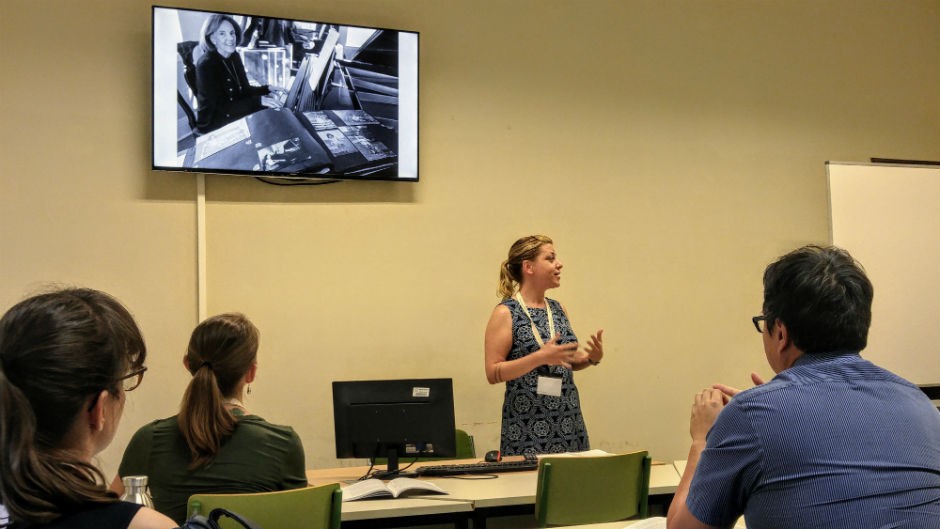Lea Kabiljo is a doctoral candidate in the Art Education program at Concordia, having obtained her Bachelor and Master's degrees from the same department. Prior to returning to Concordia to pursue her PhD she worked as a high school teacher and was the executive director of LOVE: Leave Out Violence, a leading non-profit organization in violence prevention for youth.
Blog post
More than a line on your résumé
 Participating at academic conferences offers great opportunities for graduate students. | Photo by F. Hamer
Participating at academic conferences offers great opportunities for graduate students. | Photo by F. Hamer
Last week I gave a presentation at the Memory Studies International Conference in Madrid, Spain. After a full day of presentations and discussions, I found myself at the reception, standing on the porch of the university building, overlooking the picturesque landscape in the distance. The smell of pine trees in the scorching sun reminded me of my childhood.
I sipped on a perfectly chilled glass of rosé while endless trays of Iberian delicacies seemed to appear from nowhere. My best friend was a few steps away chatting with another colleague from Concordia we just met. Around me, dozens of people were engaged in lively conversations in various languages. The mood was cheerful and light. The moment was perfect.
As I looked around, I thought about how lucky I was to be there. On second thought, I realized that this was much more than luck. Participating at academic conferences offers great opportunities for graduate students.
Nobody will argue that the world of academia values peer reviewed publications over conference presentations. It is therefore understandable that most graduate students, already stretched thin with various requirements, prefer to devote their time to writing a paper for a publication.
However, participation at conferences offers many other advantages that go beyond just another line to add on one’s résumé. Here are some of the reasons why graduate students should take the opportunity to present at academic conferences.
Presenting your research at an academic conference offers an opportunity to get valuable feedback. Your colleagues and professors from the department are already most likely familiar with the general ideas pertaining to your research. They are able to fill in the blanks and do not ask for clarifications even if something you are trying to communicate is not very clear.
At the conference, however, the majority of people you will present to are not experts on your topic. What’s more, since conferences are increasingly interdisciplinary, some of those present are possibly not familiar with your field of study.
Talking about your research to a group of people who know very little or nothing about it is a great way to validate the clarity of your ideas, and when there are questions, if you are able to provide a comprehensible answer.
Additionally, presenting to a group of strangers is an excellent exercise in public speaking. Fear of public speaking is one of the most common phobias, affecting the majority of people to some extent. One of the most effective ways to overcome this fear is by practice and more practice.
 Another major perk of participating at conferences is opportunity to discover new places. | Photo by F. Hamer
Another major perk of participating at conferences is opportunity to discover new places. | Photo by F. Hamer
Academic conferences also provide a great overview of emerging research. In addition to keynote presentations by acclaimed scholars in the field, conferences offer numerous paper presentations, round table discussions, pecha kucha and poster sessions, averaging around 10 minutes per presentation. If you attend one full day of a conference you will possibly find out about 20 new ideas, questions or concerns that fellow scholars are tackling.
In addition to presenting and finding out about new research, conferences are a great opportunity to get to know other scholars and to network. The truth is that it is highly unlikely that, by the end of the conference, the keynote speaker will be your best friend, or that someone will offer you a tenure track position during cocktail hour.
My supervisor once gave me valuable advice when she told me that it is extremely difficult to network up. So, maybe placing all your energy on finding the opportunity to give your business card to the senior editor of the most prestigious journal in your discipline is not the best networking strategy (do you really think they will be the one to contact you?).
Instead, getting to know graduate students and emerging researchers from other universities and sharing your experiences and challenges might be time better spent. After all, one of those fellow students might introduce you to their supervisor, who might happen to be that very senior editor you were hoping to meet.
One of my favourite things about participating at conferences is socializing and getting to know fellow students and professors from my own department. For every university department there is probably that one important conference in the field that most of the faculty and many students attend each year.
Away from the university, at conferences, the rank between graduate students and professors diminishes and the bond over coming from the same place gets stronger. Therefore, it is not uncommon to find yourself with fellow students and professors from your department chatting carelessly over lunch or engaging in lively discussion over a presentation you just saw.
Let’s be honest. In addition to research and networking, another major perk of participating at conferences is travel. Conferences are a great opportunity to visit and explore different places, some of which you would never travel to otherwise, others that you love coming back to. Extending your stay for a day or two will give you an opportunity to discover a different environment, disconnect, rest and refuel for the high-speed life of a graduate student.
Traveling to conferences, especially the international ones, can be quite expensive. The good news is that there are various sources of funding that can help alleviate the costs significantly. Many departments and faculties at Concordia offer some financial support. In addition, the School of Graduate Studies and Graduate Students’ Association have funding available for graduate students to participate at academic conferences.
So, with a little bit of research, time and budget planning, it is possible to have all your travel-related costs covered. Well, almost all. For tickets to a flamenco show, you are on your own.
About the author


